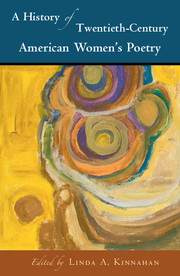Book contents
- Frontmatter
- Contents
- List of figures
- List of contributors
- Preface
- Acknowledgments
- PART I MAPPINGS AND CHRONOLOGIES
- PART II ETHNICITY, RACE, AND IDENTITY
- PART III MATERIAL FORMATIONS
- 10 The World Split Open: Feminism, Poetry, and Social Critique
- 11 Little Magazines and the Gendered, Racialized Discourse of Women's Poetry
- 12 The WP Network: Anthologies and Affiliations in Contemporary American Women's Poetry
- 13 High, Low, and Somewhere In-Between: Women's Poetry and Popular Culture in Modern America
- 14 “At the Edge of What We Know”: Gender and Environment in American Poetry
- PART IV LINEAGES, TIES, AND CONNECTIONS
- PART V FORM, LANGUAGE, AND TEXT
- PART VI CODA
- Bibliography
- Index
14 - “At the Edge of What We Know”: Gender and Environment in American Poetry
from PART III - MATERIAL FORMATIONS
Published online by Cambridge University Press: 05 June 2016
- Frontmatter
- Contents
- List of figures
- List of contributors
- Preface
- Acknowledgments
- PART I MAPPINGS AND CHRONOLOGIES
- PART II ETHNICITY, RACE, AND IDENTITY
- PART III MATERIAL FORMATIONS
- 10 The World Split Open: Feminism, Poetry, and Social Critique
- 11 Little Magazines and the Gendered, Racialized Discourse of Women's Poetry
- 12 The WP Network: Anthologies and Affiliations in Contemporary American Women's Poetry
- 13 High, Low, and Somewhere In-Between: Women's Poetry and Popular Culture in Modern America
- 14 “At the Edge of What We Know”: Gender and Environment in American Poetry
- PART IV LINEAGES, TIES, AND CONNECTIONS
- PART V FORM, LANGUAGE, AND TEXT
- PART VI CODA
- Bibliography
- Index
Summary
What is nature.
Nature is what is.
But is nature natural.
No not as natural as that.
Gertrude Stein, The Geographical History of America (1936)I'm sick of irony
Everything feels everything
Everything returns to earth
There are no spaces between us
Brenda Hillman, Practical Water (2009)In these lines, Stein and Hillman, modernist and contemporary poet, share an engagement with nature neither as backdrop nor metaphorical resource, but instead as subject of active inquiry. These epigraphs illuminate some of the persistent concerns taken up by environmentally-oriented American poetry across the twentieth century and into the present. What is nature? How do we understand and experience it, and how might it exceed our definitions, sensory perceptions, and conceptual frameworks? Is nature what is other, external to modern human cultures, or does it suffuse all phenomena? How might different cultural backgrounds contribute distinctive perspectives on environmental relations? Both Stein and Hillman offer a vision of nature that seems to brook no exception or externality. Yet both poets also point to the realm of human conceptualization and differentiation – the adjudication of what is “natural,” the distancing frame of “irony” – as what does not belong, what misperceives. At once correcting and participating in this conceptualizing work, these poems open a space for thinking with the paradoxes of nature.
Stein's lines highlight the difficulty of defining “nature” – what Raymond Williams has called “perhaps the most complex word in the language.” If nature “is what is” – all that exists – Stein suggests that it is also different than what humans imagine it to be. Nature is “not as natural as that,” more ordinary, perhaps, than our idealizations. In this sense, Stein's wry definition preserves a certain otherness and unknowability to nature, even as it remains entirely simple. Almost a century later, Hillman's lines meditate on similar questions, eschewing the term nature for an even more encompassing term: “everything.” If Stein's rhetorical approach asserts an ontology of pure presence, Hillman's poem highlights interconnection as primary. All beings, all phenomena, are caught up in a mutual feeling that does not prioritize the human. And all beings “return to earth,” participating in unceasing cycles of living, shared feeling, and dying. If for Stein nature is “what is,” for Hillman nature is “us,” an inescapable, ongoing ecological intimacy.
- Type
- Chapter
- Information
- A History of Twentieth-Century American Women's Poetry , pp. 222 - 238Publisher: Cambridge University PressPrint publication year: 2016



